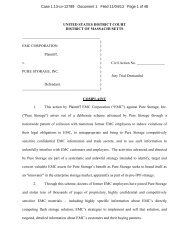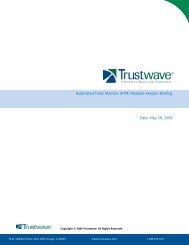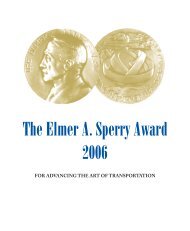filed under seal pursuant to protective order (dkt. 57)
filed under seal pursuant to protective order (dkt. 57)
filed under seal pursuant to protective order (dkt. 57)
Create successful ePaper yourself
Turn your PDF publications into a flip-book with our unique Google optimized e-Paper software.
Case 2:07-cv-00475-MJP Document 194 Filed 10/03/2008 Page 12 of 16123456789101112131415161718192021222324252627personal knowledge relevant <strong>to</strong> the suit, the party seeking discovery must show that theofficer s knowledge is so superior or unique that the party seeking the deposition could no<strong>to</strong>btain the same information through other means. See Baine, 141 F.R.D. at 335.Baine illustrates the general reluctance of courts <strong>to</strong> allow apex depositions <strong>to</strong> proceedabsent a strong showing of superior or unique knowledge. Baine arose out of an allegedlydefective passenger restraint system. During discovery, plaintiffs noticed the deposition ofEdward Mertz, a vice president of General Mo<strong>to</strong>rs and the executive in charge of the Buickdivision. Plaintiffs argued that the deposition was necessary because, during the developmen<strong>to</strong>f the restraint system, Mr. Mertz used a pro<strong>to</strong>type of the system and sent a memo <strong>to</strong> theengineering team detailing his impressions. The court, however, quashed the depositionnotice, stating that [t]he legal authority is fairly unequivocal in circumstances such as theseand finding that the plaintiffs had not demonstrated that [the vice president] has any superioror unique personal knowledge of the restraint system or of the accident. 141 F.R.D. at 334-35. In other words, it was insufficient for the plaintiffs <strong>to</strong> demonstrate that the vice presidenthad some personal knowledge of the restraint system; instead, they had <strong>to</strong> show that the vicepresident had knowledge of the restraint system so superior or unique compared <strong>to</strong> theinformation obtainable from other sources (such as the engineers who designed the product)that <strong>to</strong> prohibit the deposition would deprive the plaintiffs of the information al<strong>to</strong>gether.Because the vice president s superficial comments about the restraint system in the memodemonstrated neither superior nor unique knowledge, the court concluded that the vicepresident should not be subjected <strong>to</strong> a deposition. Id. at 335-36.Here, Mr. Ballmer has even less knowledge of the decisions regarding the technicalrequirements for and timing of the Windows Vista Capable program than the vice president ofGeneral Mo<strong>to</strong>rs in Baine. Mr. Ballmer was not involved in those decisions. The documentssurrounding the telephone call that Plaintiffs cited <strong>to</strong> justify the deposition confirm Mr.Ballmer s recollection: after being <strong>to</strong>ld of the decision <strong>to</strong> relax the Windows Vista Capablerequirements, Mr. Ballmer said he knew nothing of the details, which caused Mr. Poole whoMICROSOFT S MOTION FOR PROTECTIVE ORDER(No. C07-0475 MJP) 9Davis Wright Tremaine LLPLAW OFFICESSuite 2200 1201 Third AvenueSeattle, Washing<strong>to</strong>n 98101-3045Phone: (206) 622-3150 Fax: (206) 7<strong>57</strong>-7700






